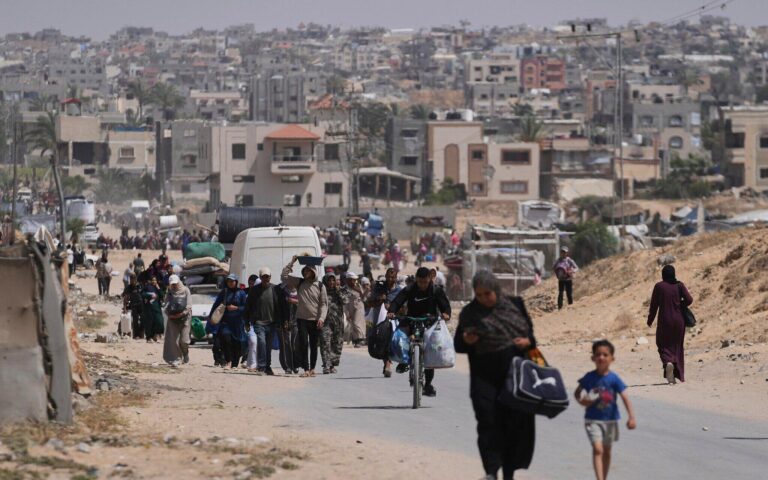The United Kingdom, France, and Canada have issued a stark warning to Israel, threatening to impose “concrete actions,” including potential sanctions, in response to its recent military operations in Gaza and the West Bank. This coordinated stance marks a significant escalation in international pressure amid mounting concerns over the humanitarian impact and ongoing violence in the region. The developments signal a growing willingness among Western allies to hold Israel accountable for its conduct, raising questions about the future dynamics of diplomatic relations and conflict resolution efforts in the troubled Middle East.
UK France and Canada signal firm measures against Israel over Gaza West Bank conflict
The diplomatic front is heating up as the United Kingdom, France, and Canada have jointly announced their intention to implement significant consequences against Israel, responding to recent developments in Gaza and the West Bank. These measures are described as “concrete actions,” signaling a shift toward potential sanctions aimed at pressuring Israel to alter its policies and approach toward the ongoing conflict. The trio emphasized a commitment to uphold international law and protect civilian populations caught in the crossfire, expressing deep concern over the escalation and humanitarian impact in the region.
Key points of the proposed actions include:
- Targeted economic sanctions against individuals and entities linked to settlement expansion and military operations
- Increased diplomatic isolation to encourage a return to peace negotiations
- Enhanced support for humanitarian aid directed to affected areas in Gaza and the West Bank
- Cooperation with international organizations to ensure accountability and monitor human rights compliance
| Country | Proposed Measures | Focus Area |
|---|---|---|
| UK | Restrict trade and freeze assets | Settlement financing |
| France | Diplomatic pressure and sanctions | Military support channels |
| Canada | Humanitarian aid enhancement | Civilian protection |
Diplomatic pressures escalate as sanctions emerge among response strategies
The diplomatic landscape is stiffening as the United Kingdom, France, and Canada jointly signal a potential shift from rhetoric to tangible measures against Israel amid ongoing tensions in Gaza and the West Bank. These nations, traditionally cautious in their approach, have underscored the severity of recent developments, emphasizing that continued non-compliance with international norms could prompt a range of punitive responses. Central to their warning is the prospect of economic sanctions targeting key sectors, aimed at compelling adherence to humanitarian standards and accountability.
Key elements of the proposed response strategy include:
- Targeted economic sanctions: focusing on trade restrictions and freezing assets linked to entities involved in disputed activities.
- Diplomatic isolation: intensifying political pressure through multilateral forums and international organizations.
- Legal action support: bolstering efforts to document alleged violations for potential prosecution in international courts.
These coordinated warnings reflect a broader shift in international engagement, highlighting increased readiness to enforce consequences for actions that exacerbate conflict and undermine peace prospects in the region.
International calls for accountability and protection of civilian rights intensify
Global pressure mounts as the United Kingdom, France, and Canada have issued stern warnings to Israel, threatening the implementation of concrete measures including targeted sanctions. These actions signal a sharp escalation in diplomatic efforts to address reported violations against civilians in Gaza and the West Bank. Governments and human rights organizations alike are calling for immediate steps to ensure the protection of non-combatants, emphasizing the urgent need for accountability from all parties involved.
Key demands from the coalition focus on:
- Halting military operations endangering civilians
- Allowing unhindered humanitarian aid access
- Launching transparent investigations into alleged abuses
- Ensuring compliance with international human rights laws
| Country | Proposed Actions | Status |
|---|---|---|
| UK | Sanctions & Diplomatic Pressure | Under Review |
| France | UN Resolutions Support & Sanctions | Consideration Phase |
| Canada | Humanitarian Aid Increase & Sanctions | Planning Stage |
Recommendations for sustained dialogue and multilateral conflict resolution efforts
Maintaining open channels of communication among all parties remains paramount to de-escalating tensions in Gaza and the West Bank. Governments and international organizations must prioritize the establishment of continuous multilateral dialogue platforms that allow for transparent exchange and mediation. These forums should incorporate diverse perspectives, including civil society representatives, to foster trust and mutual understanding. Leveraging diplomatic engagement alongside targeted economic and humanitarian support can create the necessary conditions for sustainable peace talks.
Concrete steps to advance conflict resolution should include:
- Regular high-level summits involving key stakeholders from the UK, France, Canada, and regional actors to reaffirm commitments and coordinate policies.
- Neutral peacekeeping oversight to monitor compliance with ceasefire agreements and sanctions frameworks.
- Increased support for grassroots peace initiatives that promote coexistence and dialogue at community levels.
| Effort | Expected Outcome | Lead Actors |
|---|---|---|
| Multilateral Diplomacy Forums | Renewed Multi-party Negotiations | UK, France, Canada, UN |
| Sanctions Enforcement Mechanisms | Accountability & Restriction of Violations | International Coalition |
| Grassroots Peace Programs | Community Trust Building | Local NGOs |
Insights and Conclusions
As tensions continue to escalate in Gaza and the West Bank, the united stance of the UK, France, and Canada signals a potential shift in international diplomatic pressure on Israel. With concrete actions and sanctions now on the table, the coming weeks may prove pivotal in shaping the course of the conflict and the global response. Observers will be closely monitoring how these threatened measures impact both the ground situation and the broader geopolitical landscape.




